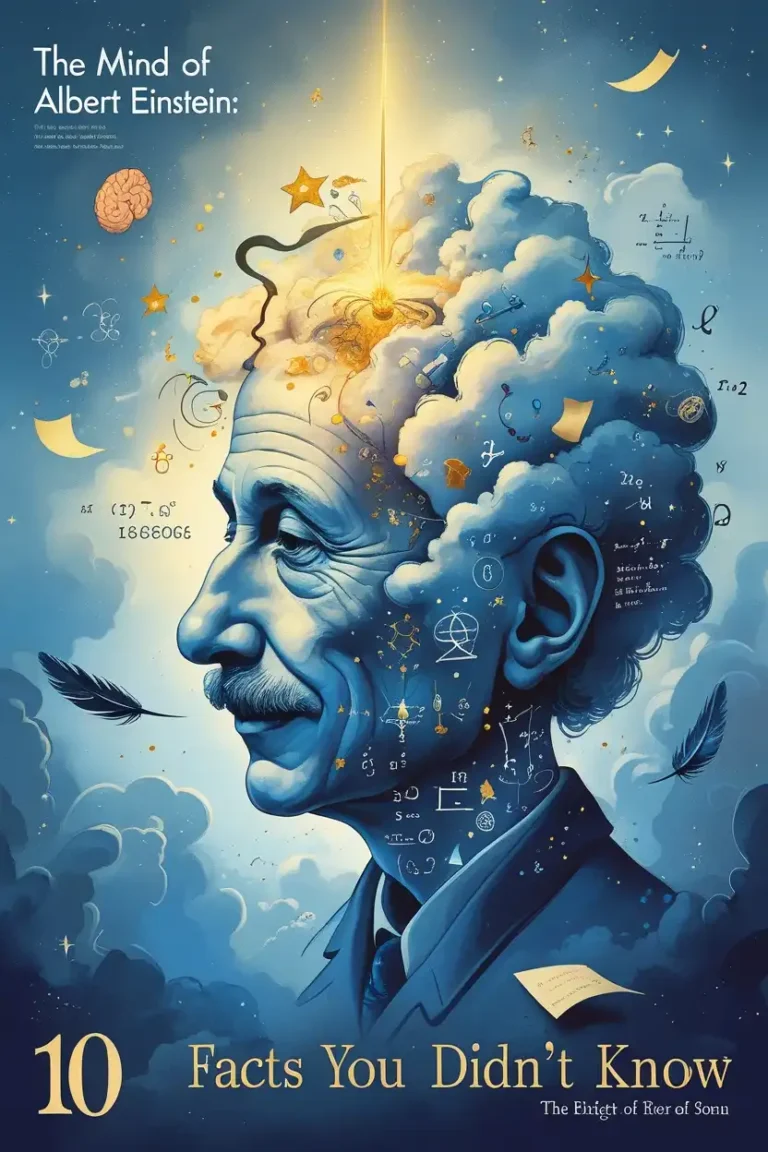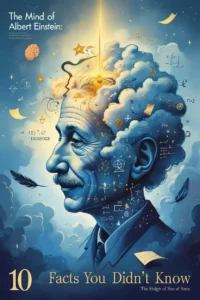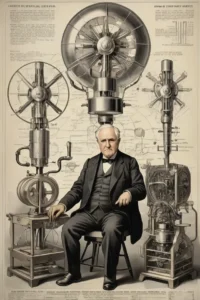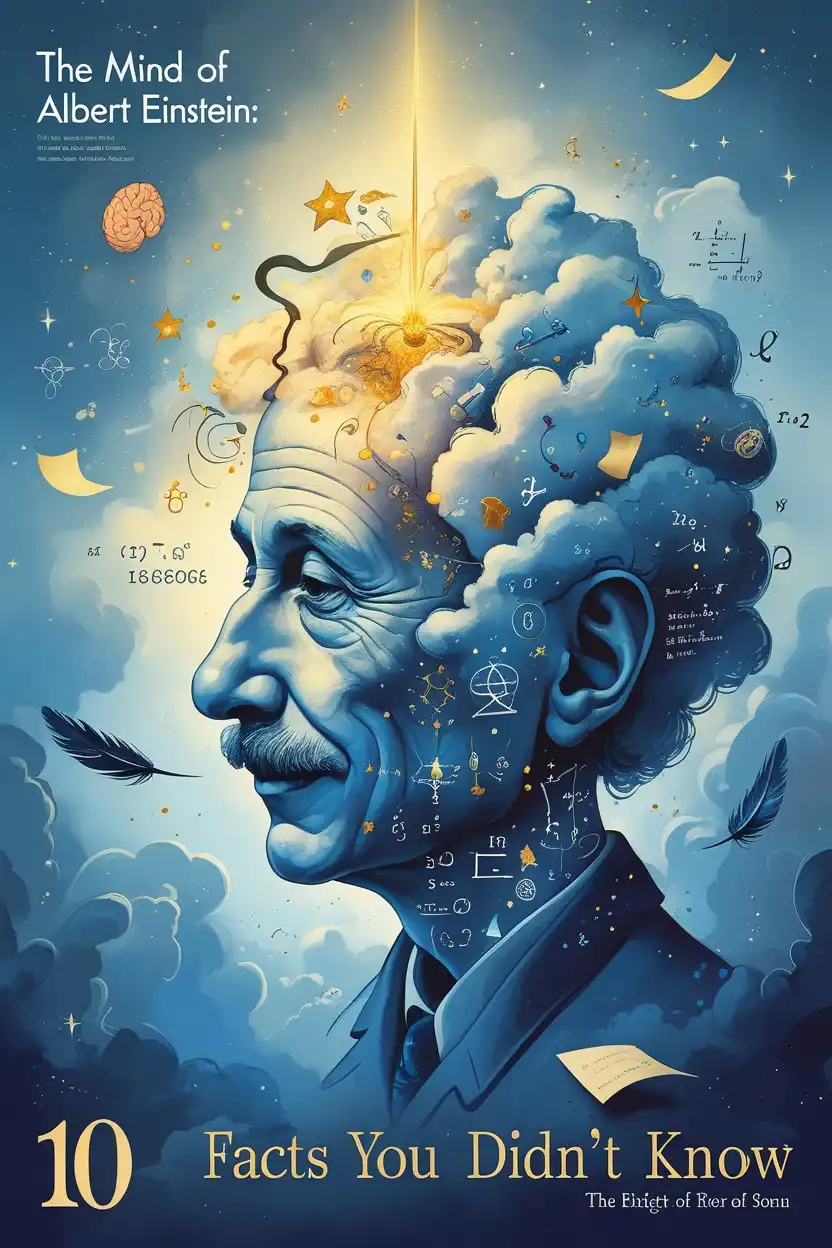Albert Einstein, the name synonymous with genius, was not just a physicist who revolutionized our understanding of the universe; he was also a complex individual with a fascinating mind. While most people associate him with the theory of relativity and his iconic equation, E=mc², there are countless other intriguing aspects of his life and intellect that remain lesser-known. In this article, we delve into 10 fascinating facts about the mind of Albert Einstein that you probably didn’t know.
1. He Didn’t Speak Until He Was Four Years Old
One of the most surprising facts about Albert Einstein is that he was considered a late bloomer as a child. He didn’t start speaking until the age of four, causing his parents to worry about his development. This phenomenon is sometimes referred to as “Einstein Syndrome,” describing children who develop speech later but often demonstrate exceptional intellectual abilities later in life.
Einstein himself later reflected on this, mentioning that he would often rehearse sentences in his head before saying them out loud. This early introspection may have contributed to his habit of deep thinking and questioning conventional norms.
2. He Failed His University Entrance Exam
Despite being a genius, Einstein’s academic journey wasn’t entirely smooth. In 1895, at the age of 16, he took the entrance exam for the Swiss Federal Polytechnic in Zurich but failed. While he excelled in mathematics and physics, he struggled with other subjects like languages and history. This setback, however, didn’t deter him; he eventually gained admission after improving his scores in other areas.
This story is a testament to how even the brightest minds can face challenges but overcome them through perseverance.
3. He Had a Strong Visual Imagination
Einstein’s thought experiments are legendary. He often visualized complex concepts rather than relying solely on mathematical equations. For instance, he imagined riding alongside a beam of light, which ultimately led to his groundbreaking theory of special relativity.
This ability to think visually and abstractly allowed Einstein to approach problems from unique perspectives, setting him apart from his contemporaries.
4. He Played the Violin to Relax His Mind
Music was an integral part of Einstein’s life. He started playing the violin as a child and continued to play throughout his life. He often turned to music to unwind and stimulate his mind when faced with challenging problems.
Einstein once said, “Life without playing music is inconceivable for me.” His love for music wasn’t just a hobby; it was also a source of inspiration and creativity.
5. He Had an Unusual Brain Structure
After Einstein’s death in 1955, his brain was studied extensively by scientists in an attempt to uncover the secrets of his genius. Researchers discovered that his parietal lobe—the region associated with mathematical reasoning and spatial understanding—was unusually large and had unique folds.
Additionally, Einstein’s brain lacked a particular groove called the Sylvian fissure, which some scientists believe may have allowed for better communication between different parts of his brain.
6. He Wasn’t a Fan of Organized Education
Einstein had a rebellious streak when it came to traditional education. He often clashed with teachers and felt that the rigid structure of schools stifled creativity and independent thought. He once remarked, “Education is what remains after one has forgotten what one has learned in school.”
Despite his disdain for formal education, Einstein never stopped learning. He believed in self-education and spent countless hours reading books and exploring topics that interested him.
7. He Had a Photographic Memory (Sort Of)
While Einstein didn’t have a photographic memory in the traditional sense, he had an extraordinary ability to recall complex theories, equations, and concepts. His deep understanding of physics allowed him to mentally organize and retrieve information with remarkable ease.
However, he was known to forget mundane details, such as names and dates, which he deemed unimportant in comparison to his intellectual pursuits.
8. He Advocated for Peace and Civil Rights
Einstein’s mind wasn’t just focused on science; he was also deeply concerned about social issues. He was an outspoken advocate for peace, especially after witnessing the devastation caused by World War I and World War II. Although he played a role in alerting the U.S. government about the potential development of nuclear weapons, he later became a vocal critic of their use.
Additionally, Einstein was a strong supporter of civil rights and spoke out against racism in America. He referred to racism as “a disease of white people” and worked closely with civil rights leaders like W.E.B. Du Bois.
9. He Loved Sailing but Couldn’t Swim
One might assume that someone as brilliant as Einstein would excel at everything he tried—but swimming wasn’t one of those things. Despite spending hours sailing on lakes during his leisure time, Einstein never learned how to swim.
Sailing provided him with solitude and an opportunity to think deeply without distractions. It was one of the many ways he nurtured his creative mind.
10. He Had a Playful Side
While Einstein is often portrayed as a serious scientist, he had a playful and humorous personality. He enjoyed cracking jokes and didn’t take himself too seriously. The famous photograph of him sticking out his tongue is a testament to his lighthearted nature.
Einstein’s wit extended beyond photographs; he often used humor to explain complex scientific ideas in simple terms, making them accessible to the general public.
FAQs About Albert Einstein
Q: Was Einstein really bad at math?
A: No, this is a common myth. Einstein excelled at mathematics from a young age and even mastered calculus by the age of 15. His struggles were more related to non-mathematical subjects like languages.
Q: Did Einstein invent the atomic bomb?
A: No, Einstein did not invent the atomic bomb. However, his famous equation E=mc² laid the theoretical foundation for understanding nuclear energy. He later regretted his indirect contribution and became an advocate for nuclear disarmament.
Q: Why is Einstein considered a genius?
A: Einstein’s genius lies in his ability to think abstractly, challenge existing paradigms, and develop groundbreaking theories like relativity that fundamentally changed our understanding of physics.
Q: What inspired Einstein’s theories?
A: Einstein’s theories were inspired by his curiosity about nature, thought experiments, and a desire to solve unanswered questions in physics, such as the nature of light and gravity.
Albert Einstein’s mind remains one of the most fascinating subjects in history. Beyond his scientific achievements, his unique personality, unconventional thinking, and deep humanitarian values continue to inspire people around the world. Whether you admire him for his intellect or his advocacy for peace, there’s no denying that Einstein was truly one of a kind.





